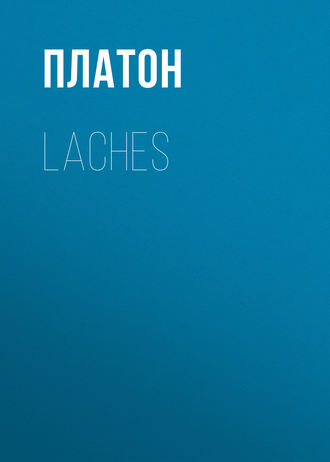
Платон
Laches
SOCRATES: Let us, Nicias and Laches, comply with the request of Lysimachus and Melesias. There will be no harm in asking ourselves the question which was first proposed to us: 'Who have been our own instructors in this sort of training, and whom have we made better?' But the other mode of carrying on the enquiry will bring us equally to the same point, and will be more like proceeding from first principles. For if we knew that the addition of something would improve some other thing, and were able to make the addition, then, clearly, we must know how that about which we are advising may be best and most easily attained. Perhaps you do not understand what I mean. Then let me make my meaning plainer in this way. Suppose we knew that the addition of sight makes better the eyes which possess this gift, and also were able to impart sight to the eyes, then, clearly, we should know the nature of sight, and should be able to advise how this gift of sight may be best and most easily attained; but if we knew neither what sight is, nor what hearing is, we should not be very good medical advisers about the eyes or the ears, or about the best mode of giving sight and hearing to them.
LACHES: That is true, Socrates.
SOCRATES: And are not our two friends, Laches, at this very moment inviting us to consider in what way the gift of virtue may be imparted to their sons for the improvement of their minds?
LACHES: Very true.
SOCRATES: Then must we not first know the nature of virtue? For how can we advise any one about the best mode of attaining something of which we are wholly ignorant?
LACHES: I do not think that we can, Socrates.
SOCRATES: Then, Laches, we may presume that we know the nature of virtue?
LACHES: Yes.
SOCRATES: And that which we know we must surely be able to tell?
LACHES: Certainly.
SOCRATES: I would not have us begin, my friend, with enquiring about the whole of virtue; for that may be more than we can accomplish; let us first consider whether we have a sufficient knowledge of a part; the enquiry will thus probably be made easier to us.
LACHES: Let us do as you say, Socrates.
SOCRATES: Then which of the parts of virtue shall we select? Must we not select that to which the art of fighting in armour is supposed to conduce? And is not that generally thought to be courage?
LACHES: Yes, certainly.
SOCRATES: Then, Laches, suppose that we first set about determining the nature of courage, and in the second place proceed to enquire how the young men may attain this quality by the help of studies and pursuits. Tell me, if you can, what is courage.
LACHES: Indeed, Socrates, I see no difficulty in answering; he is a man of courage who does not run away, but remains at his post and fights against the enemy; there can be no mistake about that.
SOCRATES: Very good, Laches; and yet I fear that I did not express myself clearly; and therefore you have answered not the question which I intended to ask, but another.
LACHES: What do you mean, Socrates?
SOCRATES: I will endeavour to explain; you would call a man courageous who remains at his post, and fights with the enemy?
LACHES: Certainly I should.
SOCRATES: And so should I; but what would you say of another man, who fights flying, instead of remaining?
LACHES: How flying?
SOCRATES: Why, as the Scythians are said to fight, flying as well as pursuing; and as Homer says in praise of the horses of Aeneas, that they knew 'how to pursue, and fly quickly hither and thither'; and he passes an encomium on Aeneas himself, as having a knowledge of fear or flight, and calls him 'an author of fear or flight.'
LACHES: Yes, Socrates, and there Homer is right: for he was speaking of chariots, as you were speaking of the Scythian cavalry, who have that way of fighting; but the heavy-armed Greek fights, as I say, remaining in his rank.
SOCRATES: And yet, Laches, you must except the Lacedaemonians at Plataea, who, when they came upon the light shields of the Persians, are said not to have been willing to stand and fight, and to have fled; but when the ranks of the Persians were broken, they turned upon them like cavalry, and won the battle of Plataea.
LACHES: That is true.
SOCRATES: That was my meaning when I said that I was to blame in having put my question badly, and that this was the reason of your answering badly. For I meant to ask you not only about the courage of heavy-armed soldiers, but about the courage of cavalry and every other style of soldier; and not only who are courageous in war, but who are courageous in perils by sea, and who in disease, or in poverty, or again in politics, are courageous; and not only who are courageous against pain or fear, but mighty to contend against desires and pleasures, either fixed in their rank or turning upon their enemy. There is this sort of courage – is there not, Laches?
LACHES: Certainly, Socrates.
SOCRATES: And all these are courageous, but some have courage in pleasures, and some in pains: some in desires, and some in fears, and some are cowards under the same conditions, as I should imagine.
LACHES: Very true.
SOCRATES: Now I was asking about courage and cowardice in general. And I will begin with courage, and once more ask, What is that common quality, which is the same in all these cases, and which is called courage? Do you now understand what I mean?
LACHES: Not over well.
SOCRATES: I mean this: As I might ask what is that quality which is called quickness, and which is found in running, in playing the lyre, in speaking, in learning, and in many other similar actions, or rather which we possess in nearly every action that is worth mentioning of arms, legs, mouth, voice, mind; – would you not apply the term quickness to all of them?
LACHES: Quite true.
SOCRATES: And suppose I were to be asked by some one: What is that common quality, Socrates, which, in all these uses of the word, you call quickness? I should say the quality which accomplishes much in a little time – whether in running, speaking, or in any other sort of action.
LACHES: You would be quite correct.
SOCRATES: And now, Laches, do you try and tell me in like manner, What is that common quality which is called courage, and which includes all the various uses of the term when applied both to pleasure and pain, and in all the cases to which I was just now referring?
LACHES: I should say that courage is a sort of endurance of the soul, if I am to speak of the universal nature which pervades them all.
SOCRATES: But that is what we must do if we are to answer the question. And yet I cannot say that every kind of endurance is, in my opinion, to be deemed courage. Hear my reason: I am sure, Laches, that you would consider courage to be a very noble quality.
LACHES: Most noble, certainly.
SOCRATES: And you would say that a wise endurance is also good and noble?
LACHES: Very noble.
SOCRATES: But what would you say of a foolish endurance? Is not that, on the other hand, to be regarded as evil and hurtful?
LACHES: True.
SOCRATES: And is anything noble which is evil and hurtful?
LACHES: I ought not to say that, Socrates.
SOCRATES: Then you would not admit that sort of endurance to be courage – for it is not noble, but courage is noble?
LACHES: You are right.
SOCRATES: Then, according to you, only the wise endurance is courage?
LACHES: True.
SOCRATES: But as to the epithet 'wise,' – wise in what? In all things small as well as great? For example, if a man shows the quality of endurance in spending his money wisely, knowing that by spending he will acquire more in the end, do you call him courageous?
LACHES: Assuredly not.
SOCRATES: Or, for example, if a man is a physician, and his son, or some patient of his, has inflammation of the lungs, and begs that he may be allowed to eat or drink something, and the other is firm and refuses; is that courage?
LACHES: No; that is not courage at all, any more than the last.
SOCRATES: Again, take the case of one who endures in war, and is willing to fight, and wisely calculates and knows that others will help him, and that there will be fewer and inferior men against him than there are with him; and suppose that he has also advantages of position; would you say of such a one who endures with all this wisdom and preparation, that he, or some man in the opposing army who is in the opposite circumstances to these and yet endures and remains at his post, is the braver?
LACHES: I should say that the latter, Socrates, was the braver.
SOCRATES: But, surely, this is a foolish endurance in comparison with the other?
LACHES: That is true.
SOCRATES: Then you would say that he who in an engagement of cavalry endures, having the knowledge of horsemanship, is not so courageous as he who endures, having no such knowledge?
LACHES: So I should say.
SOCRATES: And he who endures, having a knowledge of the use of the sling, or the bow, or of any other art, is not so courageous as he who endures, not having such a knowledge?
LACHES: True.
SOCRATES: And he who descends into a well, and dives, and holds out in this or any similar action, having no knowledge of diving, or the like, is, as you would say, more courageous than those who have this knowledge?
LACHES: Why, Socrates, what else can a man say?
SOCRATES: Nothing, if that be what he thinks.
LACHES: But that is what I do think.
SOCRATES: And yet men who thus run risks and endure are foolish, Laches, in comparison of those who do the same things, having the skill to do them.
LACHES: That is true.
SOCRATES: But foolish boldness and endurance appeared before to be base and hurtful to us.
LACHES: Quite true.
SOCRATES: Whereas courage was acknowledged to be a noble quality.
LACHES: True.
SOCRATES: And now on the contrary we are saying that the foolish endurance, which was before held in dishonour, is courage.
LACHES: Very true.
SOCRATES: And are we right in saying so?
LACHES: Indeed, Socrates, I am sure that we are not right.
SOCRATES: Then according to your statement, you and I, Laches, are not attuned to the Dorian mode, which is a harmony of words and deeds; for our deeds are not in accordance with our words. Any one would say that we had courage who saw us in action, but not, I imagine, he who heard us talking about courage just now.
LACHES: That is most true.
SOCRATES: And is this condition of ours satisfactory?
LACHES: Quite the reverse.
SOCRATES: Suppose, however, that we admit the principle of which we are speaking to a certain extent.
LACHES: To what extent and what principle do you mean?
SOCRATES: The principle of endurance. We too must endure and persevere in the enquiry, and then courage will not laugh at our faint-heartedness in searching for courage; which after all may, very likely, be endurance.
LACHES: I am ready to go on, Socrates; and yet I am unused to investigations of this sort. But the spirit of controversy has been aroused in me by what has been said; and I am really grieved at being thus unable to express my meaning. For I fancy that I do know the nature of courage; but, somehow or other, she has slipped away from me, and I cannot get hold of her and tell her nature.
SOCRATES: But, my dear friend, should not the good sportsman follow the track, and not be lazy?
LACHES: Certainly, he should.
SOCRATES: And shall we invite Nicias to join us? he may be better at the sport than we are. What do you say?
LACHES: I should like that.
SOCRATES: Come then, Nicias, and do what you can to help your friends, who are tossing on the waves of argument, and at the last gasp: you see our extremity, and may save us and also settle your own opinion, if you will tell us what you think about courage.
NICIAS: I have been thinking, Socrates, that you and Laches are not defining courage in the right way; for you have forgotten an excellent saying which I have heard from your own lips.
SOCRATES: What is it, Nicias?
NICIAS: I have often heard you say that 'Every man is good in that in which he is wise, and bad in that in which he is unwise.'
SOCRATES: That is certainly true, Nicias.






